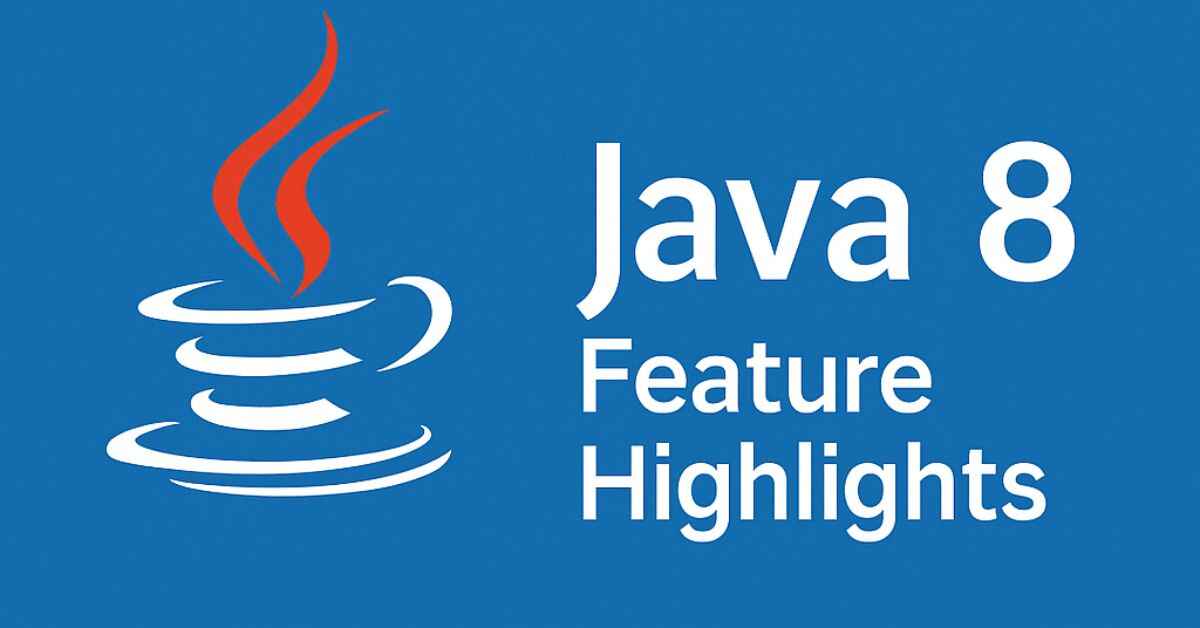|
Getting your Trinity Audio player ready... |
Originally published on Makemychance.com
Java 8 was a major milestone in Java’s history. It introduced powerful new features that changed how we write Java code — making it more concise, readable, and functional.
If you’re still working with Java and haven’t explored Java 8 features properly, this article will get you up to speed with the ones that matter most in real-world projects.
Let’s break down the top Java 8 features you should actually care about.
☕ 1. Lambda Expressions
Lambda expressions let you write functions in a more compact way — no need for full anonymous classes.
🔧 Old way:
Runnable r = new Runnable() {
public void run() {
System.out.println("Running...");
}
};
✅ Java 8 way:
Runnable r = () -> System.out.println("Running...");
Use case: cleaner code with functional interfaces like Runnable, Comparator, etc.
🔁 2. Streams API
One of the biggest features — the Streams API allows functional-style processing of collections.
Example:
List<String> names = Arrays.asList("John", "Arsalan", "David", "Anna");
names.stream()
.filter(name -> name.startsWith("A"))
.sorted()
.forEach(System.out::println);
You can filter, map, sort, and collect data in a single readable flow.
🧠 3. Functional Interfaces
Java 8 introduced @FunctionalInterface to enforce interfaces that have a single abstract method.
Common examples:
RunnableCallableComparatorFunction<T, R>Consumer<T>Supplier<T>
You can pass these as lambda expressions — a clean and modern coding style.
📦 4. Default and Static Methods in Interfaces
Before Java 8, interfaces couldn’t have method implementations. Now they can.
interface MyInterface {
default void show() {
System.out.println("Default method");
}
static void log() {
System.out.println("Static method");
}
}
✅ Great for maintaining backward compatibility without breaking existing code.
📅 5. New Date and Time API (java.time)
Java finally fixed its messy Date and Calendar system. Java 8 introduced the modern java.time package.
LocalDate date = LocalDate.now();
LocalDate birthday = LocalDate.of(1995, Month.MARCH, 25);
Period age = Period.between(birthday, date);
System.out.println(age.getYears());
It’s immutable, thread-safe, and much easier to work with.
🗃️ 6. Optional Class
No more NullPointerException if used right. Optional is a container that may or may not contain a non-null value.
Optional<String> name = Optional.ofNullable(getUserName());
name.ifPresent(System.out::println);
Use Optional to handle nulls more gracefully and make your code more readable.
🏁 7. Method References
A cleaner way to call methods using :: operator.
Example:
list.forEach(System.out::println);
Equivalent to:
list.forEach(item -> System.out.println(item));
💥 8. Collectors API (with Stream)
Helps you convert stream results into List, Set, Map, etc.
List<String> names = people.stream()
.map(Person::getName)
.collect(Collectors.toList());
You can also use groupingBy, joining, and many other handy collectors.
🧰 9. Nashorn JavaScript Engine
You can run JavaScript code directly from Java using Nashorn.
ScriptEngine engine = new ScriptEngineManager().getEngineByName("nashorn");
engine.eval("print('Hello from JS')");
Although deprecated in Java 15+, it was useful for scripting and lightweight automation.
✅ Summary – What You Should Use
| Feature | Use it for |
|---|---|
| Lambda Expressions | Writing compact, functional code |
| Streams API | Efficient data processing |
| Default Methods | Backward compatibility in interfaces |
| Date/Time API | Clean date handling |
| Optional | Avoid null checks |
| Method References | More readable code |
🔚 Final Thoughts
Java 8 is still the most widely used version in many companies, and for good reason. Its features are powerful, stable, and improve code readability a lot.
If you haven’t explored these properly yet — start small with lambda and stream. Once you’re used to that, everything else falls into place.

Arsalan Malik is a passionate Software Engineer and the Founder of Makemychance.com. A proud CDAC-qualified developer, Arsalan specializes in full-stack web development, with expertise in technologies like Node.js, PHP, WordPress, React, and modern CSS frameworks.
He actively shares his knowledge and insights with the developer community on platforms like Dev.to and engages with professionals worldwide through LinkedIn.
Arsalan believes in building real-world projects that not only solve problems but also educate and empower users. His mission is to make technology simple, accessible, and impactful for everyone.
Join us on dev community



